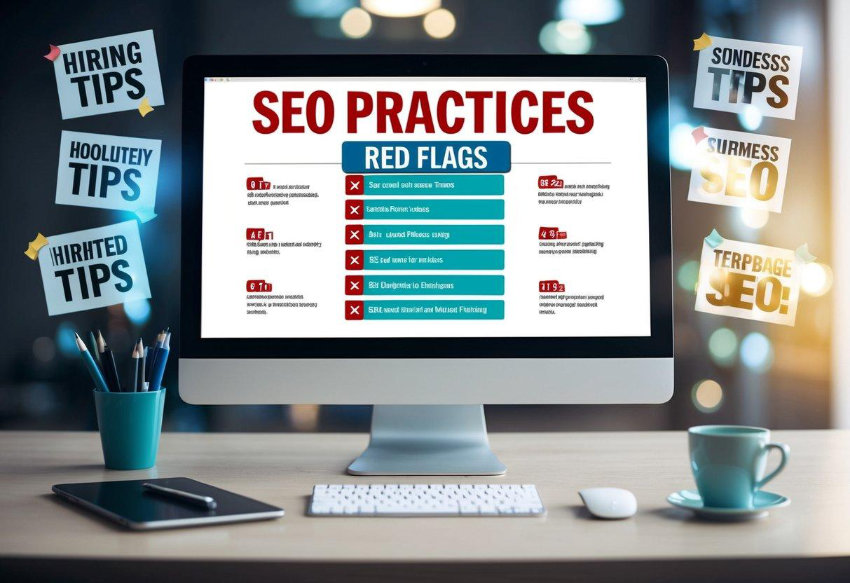Show:
SEO Red Flags to Watch Out For: Avoiding Common Pitfalls in Search Optimization
SEO can be tricky to navigate, especially when seeking help. Watch out for agencies that promise quick results or guaranteed rankings, as these are major red flags. When searching for a top SEO company, it’s crucial to also spot green flags before committing. Avoid cookie-cutter approaches that don’t align with your specific business goals.

When searching for an SEO partner, I always look for clear communication and custom strategies. A good agency will take the time to learn about my business and create a plan that fits my needs. They’ll also be upfront about their methods and provide detailed reports on their work.
Key Takeaways
- Be wary of SEO providers promising fast results or guaranteed rankings
- Look for agencies that offer custom strategies and clear communication
- Choose an SEO partner who aligns with your business goals and values
Identifying SEO Red Flags
As an SEO expert, I’ve seen many warning signs that can hurt a website’s search rankings. These red flags often show up in reporting, outdated methods, and quick-fix promises. Let’s look at some key issues to watch out for.
Vague Reporting Practices
I always stress the importance of clear, detailed reports. Vague updates are a big red flag in SEO services. Good reports should show:
- Specific metrics like organic traffic growth
- Keyword rankings over time
- Backlink profiles and changes
I avoid agencies that only talk about “improvements” without hard numbers. Watch out for those who focus on vanity metrics like raw traffic counts. These can be misleading. Instead, I look for reports that tie SEO efforts to real business goals, like leads or sales.
Outdated SEO Techniques
SEO changes fast, and old tricks can hurt your site. I stay away from services that use:
- Keyword stuffing
- Hidden text or links
- Buying low-quality backlinks
- Duplicate content across pages
These methods might have worked years ago, but now they can get your site penalized. I focus on creating high-quality content and earning natural links. It’s slower but much safer for long-term success.
The Perils of Quick Fixes
I’m always wary of SEO promises that sound too good to be true. Quick fixes often lead to trouble. Red flags include:
- Guarantees of first-page rankings
- Huge traffic increases in days or weeks
- Secret techniques that “trick” Google
Real SEO takes time and hard work. I build custom strategies for each client based on their unique needs and goals. One-size-fits-all approaches rarely work well. Instead, I create content that serves users first and search engines second. This patient approach pays off with steady, sustainable growth.
The Impact on Business Objectives
SEO red flags can have big effects on a company’s goals. They can waste money and time, and hurt growth. Let’s look at two key issues.
Lack of Tailored SEO Strategy
A one-size-fits-all SEO plan often fails. It doesn’t match a business’s unique needs and target audience. I’ve seen companies use generic tactics that don’t fit their market. This leads to poor results and wasted effort.
A good SEO provider should learn about your business. They need to know your products, customers, and goals. Without this, they can’t make a plan that works for you.
Generic strategies might bring some traffic. But it’s often the wrong kind of traffic. You want visitors who might buy, not just any clicks. A tailored plan focuses on your ideal customers. It uses keywords and content they care about.

Variables Measuring SEO Success
Picking the right success metrics is crucial. Some SEO firms focus on rankings alone. But high rankings don’t always mean more sales or profit.
I recommend looking at these key factors:
- Organic traffic growth
- Conversion rates
- Revenue from organic search
- Return on investment (ROI)
Traffic is good, but conversions matter more. Are visitors taking action? Signing up, buying, or contacting you? These show real business impact.
ROI tells you if SEO efforts are worth the cost. It compares money spent to money earned. A positive ROI means SEO is helping your bottom line.
By tracking these, you can see if SEO truly helps your business goals. Don’t let an SEO provider distract you with vanity metrics. Focus on what really grows your business.
What Are Key SEO Red Flags and How Can I Avoid Common Search Optimization Mistakes?
Q: What are some red flags when hiring an SEO company?
A: Some key red flags include promises of overnight results, guarantees of #1 rankings, lack of transparency in methods, and unusually low prices. Be wary of companies that use black hat techniques or can’t provide case studies or references.
Q: How can I tell if an SEO strategy is too good to be true?
A: If it sounds too good to be true, it probably is. Be skeptical of promises for immediate results or guaranteed rankings. Legitimate SEO takes time and involves ongoing effort. Any company promising instant success is likely using risky tactics that could harm your site in the long run.
Q: What are some common SEO mistakes to avoid?
A: Common pitfalls include keyword stuffing, neglecting mobile optimization, ignoring site speed, producing low-quality content, and overlooking local SEO. It’s also crucial to avoid duplicate content and ensure your site is easily crawlable by search engines.
Q: Is it a red flag if an SEO company doesn’t share their methods?
A: Absolutely. Transparency is key in SEO. A reputable company should be able to explain their strategies and tactics clearly. If they’re vague or secretive about their methods, it could indicate they’re using black hat techniques that could get your site penalized.
Q: How important is it for an SEO company to understand my specific industry?
A: It’s very important. A one-size-fits-all approach to SEO is a red flag. Look for a company that takes the time to understand your industry, target audience, and specific business goals. They should tailor their strategy to your unique needs.
Q: What should I look for in SEO reporting?
A: Good SEO reporting should be clear, regular, and comprehensive. It should include metrics like organic traffic, keyword rankings, backlink profiles, and conversions. Be wary of reports that focus solely on vanity metrics or don’t tie back to your business objectives.
Q: Is it normal for an SEO company to ask for immediate access to all my accounts?
A: While an SEO company will need access to certain accounts to do their job, be cautious if they demand immediate, full access to everything. A reputable company will explain why they need access and should be willing to sign non-disclosure agreements if necessary.
Remember, good SEO practices focus on providing value to users while adhering to search engine guidelines. Any tactics that prioritize manipulating search engines over serving users should be seen as a red flag.
How Can I Implement Effective SEO Practices and Choose the Right SEO Partner?

Finding the right SEO approach and partner can make a big difference for your website’s success. Let’s look at key parts of good SEO and how to pick a great SEO company.
Components of a Robust SEO Approach
A strong SEO plan uses many parts working together. I start with keyword research to find what people search for. Then I optimize title tags and metadata to help search engines understand my pages.
Content creation is crucial. I write helpful articles that answer questions and use keywords naturally. I also make sure my site works well on phones and loads quickly.
Local search matters for many businesses. I add location info and get listed in online directories. Link building is important too. I get links from good websites in my field.
Choosing the Right SEO Partner
When I look for an SEO expert, I check their past work and results. I ask for case studies and talk to former clients. A good SEO company explains their methods clearly.
I avoid firms that promise quick fixes or top rankings. Real SEO takes time and effort. I look for partners who focus on my business goals, not just rankings.
A full-service digital marketing agency can be a good choice. They often have experts in SEO, content, and web development. This lets them handle all parts of my online presence.
I make sure the SEO team keeps me updated with clear reports. They should show how their work impacts my site traffic and sales.

 Return to Previous Page
Return to Previous Page








